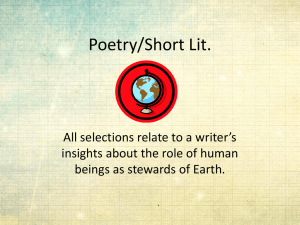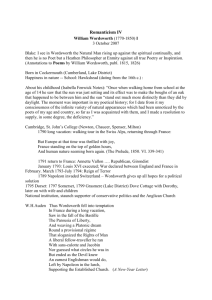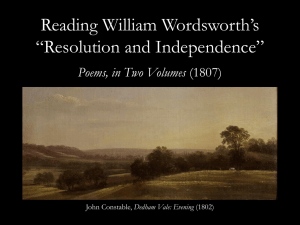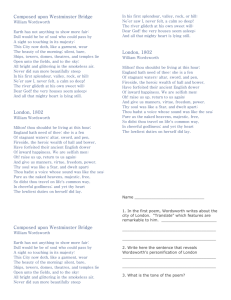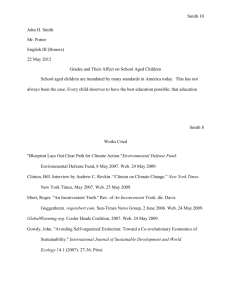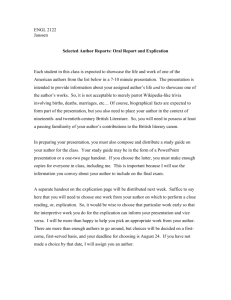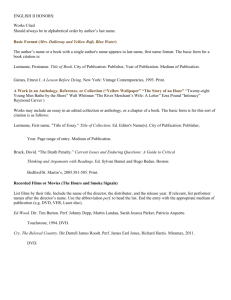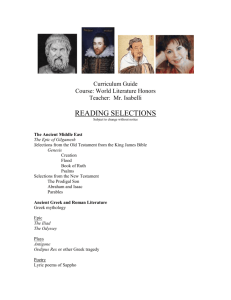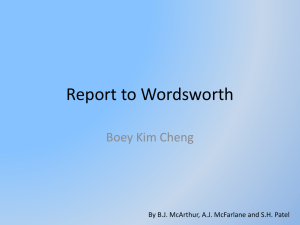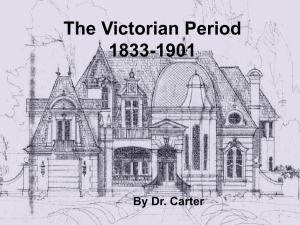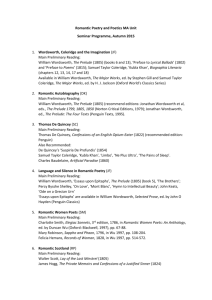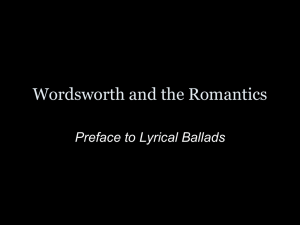The Lost Leader ()
advertisement
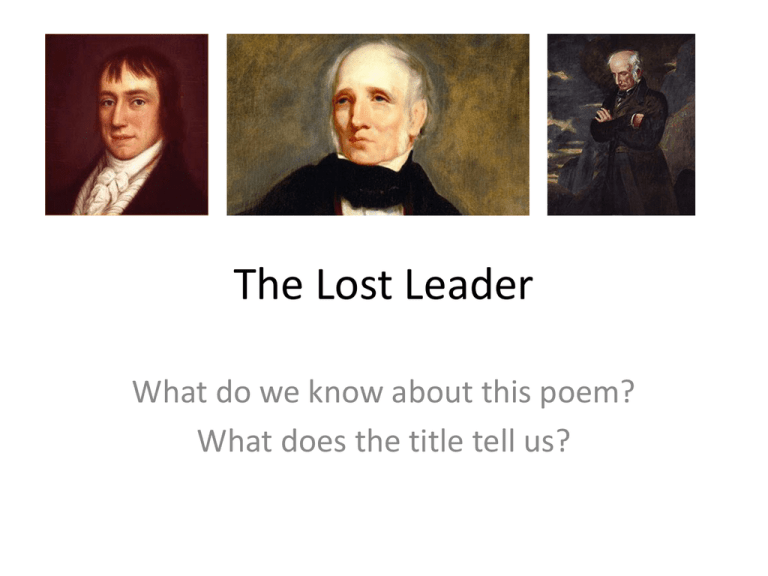
The Lost Leader What do we know about this poem? What does the title tell us? This poem is about... ...the betrayal of a leader who has deserted his cause. The speaker attacks the ‘lost’ leader as well as remembering how great he once was. The poem is based on William Wordsworth, as an example of someone who Browning considered a traitor to the liberal cause. Context William Wordsworth 1770-1850 English Romantic poet When Wordsworth was young, he was somewhat of a liberal rebel. Coleridge described him as a ‘semi-atheist’ and he described himself as a ‘patriot of the world’. Wordsworth defended Thomas Paine’s Rights of Man (which held that political revolution was permissible when a government did not safeguard its people and their rights) and supported the French Revolution. As he grew older, he became less liberal in his beliefs and eventually gave up his revolutionary ideas. In 1813 he gained a government position, in 1842 he accepted a government pension, and in 1843 he became Poet Laureate. Mild sonnet of reprimand by Shelley: To Wordsworth Wordsworth’s contemporaries were critical of his choices. Browning in particular saw his acceptance of the position of Poet Laureate as a, “final surrender to the forces of conservatism” and wrote The Lost Leader to express his resulting disgust and sense of betrayal. Browning had been an admirer of Wordsworth from an early age, seeking to become his “radical successor”. He felt personally betrayed. Robert Lynd: “[Browning thought] that Wordsworth was a turncoat, a renegade- a poet who began as the champion of liberty and ended as its enemy.” Wordsworth on Browning: “Miss Barrett, I am pleased to learn, is so much recovered as to have taken herself a Husband. Her choice is a very able man, and I trust that it will be a happy union, not doubting that they will speak more intelligibly to each other than, notwithstanding their abilities, they have yet done to the public.” Browning always made it clear that the poem was based on Wordsworth, but stopped short of saying that it was directly addressed to Wordsworth himself, instead saying that the portrait was "purposely disguised a little, used in short as an artist uses a model, retaining certain characteristic traits, and discarding the rest". Thus the poem was on the Lost Leader in the abstract, with Wordsworth being the most prominent concrete example. Language Ribbon signifying official position (Poet Laureate) Link to royalty/ officials Just for a handful of silver he left us, Just for a riband to stick in his coat— Left without Found the one gift of which fortune bereft us, Lost all the others she lets us devote; They, with the gold to give, doled him out silver, So much was theirs who so little allowed: How all our copper had gone for his service! Rags—were they purple, his heart had been proud! We that had loved him so, followed him, honoured him, Lived in his mild and magnificent eye, Learned his great language, caught his clear accents, Made him our pattern to live and to die! Shakespeare was of us, Milton was for us, Burns, Shelley, were with us,—they watch from their graves! He alone breaks from the van and the freemen, He alone sinks to the rear and the slaves! 5 10 15 Vanguard: 1. (Military) the leading division or units of a military force 2. the leading position in any movement or field, or the people who occupy such a position Being quiet, still or idle We shall march prospering,—not through his presence; Songs may inspirit us,—not from his lyre; Deeds will be done,—while he boasts his quiescence, Still bidding crouch whom the rest bade aspire: Blot out his name, then, record one lost soul more, One task more declined, one more footpath untrod, One more devils’-triumph and sorrow for angels, One wrong more to man, one more insult to God! Life’s night begins: let him never come back to us! There would be doubt, hesitation, and pain, Forced praise on our part—the glimmer of twilight, Never glad confident morning again! Best fight on well, for we taught him—strike gallantly, Menace our heart ere we master his own; Then let him receive the new knowledge and wait us, Pardoned in heaven, the first by the throne! 20 25 30 Imagery Religious imagery: Find any religious imagery in the poem. What is the effect of its inclusion? Form Dramatic monologue. Declaimable in form, using strong masculine rhymes (rhyme that matches one syllable, usually at the end of the line). First stanza: focuses on leader’s betrayal. Second stanza: rouses speaker’s followers to continue without the ‘lost leader’. Structure - Rhyme 2 x stanzas, 16 lines in each. Rhyme scheme: abcbdefe First four lines: abab – reflects the unity the speaker felt with the ‘leader’ prior to the disjointedness that follows. Rhyme has not been removed completely, though. They will endure regardless. Structure - Meter Dactylic tetrameter: one long syllable followed by two short syllables, repeated four times: Just for a handful of silver he left us Just for a riband to stick in his coat The subsequent lines introduce minor irregularities to disrupt the pattern, e.g. missing off a syllable at the end of a line. This places extra emphasis on the last word of the affected lines (e.g. eye/die). This use of meter creates a rhythm like a snare drum and makes the poem sound like a battle song. The use of caesura at the start of the 2nd stanza breaks up the meter further, almost like a ‘call and response’ battle march. How does Browning present Wordsworth and, more generally, those who choose to join the established elite rather than follow the more difficult road of the liberal cause?
